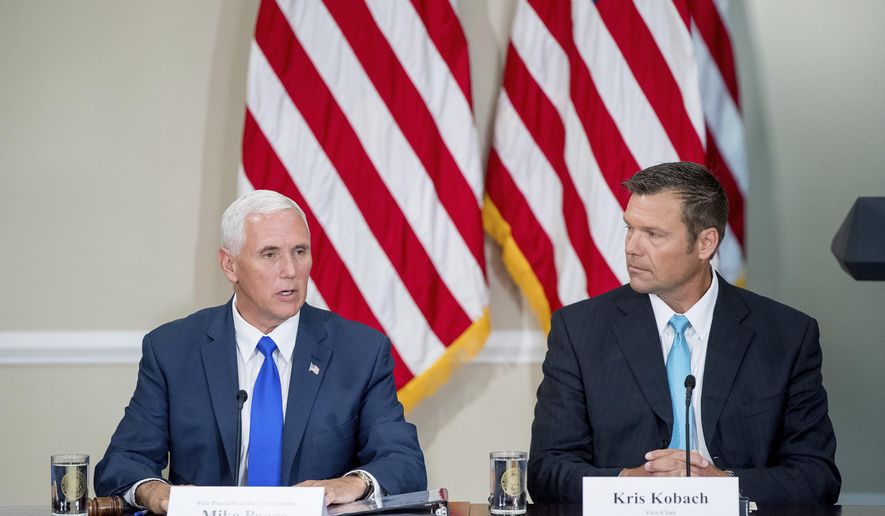President Trump dissolved his voter integrity commission Wednesday and ordered the Homeland Security Department to take up the job instead, in a move his backers said could speed up an investigation of the extent of voter fraud.
Mr. Trump decided the commission had become mired in legal challenges and it was a waste of money to continue, when much of the same work could be performed by existing federal agencies.
Democrats and liberal activists claimed victory, saying they stopped a threat to democracy by derailing the panel, known officially as the Presidential Advisory Commission on Election Integrity.
But Kris Kobach, who was vice chairman of the panel, said Democrats come out behind because the commission’s work will continue but will be completed without any input from Democrats, who had been part of the commission but won’t have a say in Homeland Security’s work.
“It will get done faster, but the Democrats no longer have a seat at the table,” Mr. Kobach said. “If they think this is a victory for the left, they are wrong.”
The White House announced the president’s decision in a statement late Wednesday evening, saying Mr. Trump signed an executive order bringing the 8-month-old effort to an end.
SEE ALSO: Kris Kobach says canceling voter panel will speed up investigation
“Despite substantial evidence of voter fraud, many states have refused to provide the Presidential Advisory Commission on Election Integrity with basic information relevant to its inquiry,” press secretary Sarah Huckabee Sanders said. “Rather than engage in endless legal battles at taxpayer expense, today President Donald J. Trump signed an executive order to dissolve the commission, and he has asked the Department of Homeland Security to review its initial findings and determine next courses of action.”
Mr. Trump had set up the commission, chaired by Vice President Mike Pence, to investigate his postelection claims that voter fraud is a massive problem that cut into his 2016 vote margins.
The panel struggled from the start, however, with Democratic state officials refusing to comply with requests for public voter roll data that in many cases can be easily bought.
At least eight lawsuits were filed to try to derail the commission, accusing it of violating open-records laws or breaking privacy protections by asking for the state voter data.
One of the lawsuits was even filed by a panel member, Maine Secretary of State Matthew Dunlap, one of five Democrats on the commission. Mr. Dunlap had accused the commission of hiding information from him.
A federal judge last month agreed, ordering the commission to be more forthcoming.
The commission said it wasn’t hiding any information and that its business had dried up after a series of mishaps.
One panel researcher was arrested on charges of child pornography, while a commissioner, former Arkansas state Rep. David Dunn, died in October. His name was still listed on the commission’s website as of Wednesday.
The commission, created in May, held just two meetings — one in July and another in September.
Although the commission’s work wasn’t completed, Mr. Kobach said, members were able to highlight some information, such as 8,500 documented cases of double-voting in elections in 21 states and 1,000 convictions for voter fraud since 2000.
But the biggest job of the commission was to obtain voter data from states and compare it to Homeland Security databases to determine the extent of noncitizens’ registration and voting.
Mr. Kobach said given the hurdles the commission faced, it made sense for the president to ask the department to complete the investigation.
“DHS can do it more freely and efficiently than a commission can,” Mr. Kobach said. “The most important info that only the DHS can provide is how many aliens we have on the voter rolls.”
Such a count has been difficult to come by over the years, though efforts by some nongovernmental groups have exposed scattered instances.
The Public Interest Legal Foundation, run by J. Christian Adams, who was also a member of the Trump voter commission, found thousands of self-admitted noncitizens who registered to vote in Philadelphia, Virginia and New Jersey. In many of the cases, the noncitizens cast illegal ballots.
Democrats and liberal activists reacted with glee to Mr. Trump’s announcement.
“This is a major victory for every activist who has called out this sham commission for what it is. Good riddance to bad rubbish,” said Marge Baker, executive vice president of People for the American Way.
Senate Minority Leader Charles E. Schumer, New York Democrat, said the panel was ill-founded from the start and that he hoped the president learned a lesson from having to make an about-face.
“The commission never had anything to do with election integrity. It was instead a front to suppress the vote, perpetrate dangerous and baseless claims, and was ridiculed from one end of the country to the other,” Mr. Schumer said.
The Brennan Center, which filed some of the lawsuits trying to stop the commission, said its demise proves there was never any evidence of voter fraud in the first place.
Mr. Kobach said the commission wasn’t a mistake but that the level of opposition made clear it was going to be a morass.
“The fact that the commission encountered so many lawsuits and such resistance illustrates just how the partisan left is determined to obstruct the gaining of information about the extent of voter fraud,” he said.
• Stephen Dinan can be reached at sdinan@washingtontimes.com.




Please read our comment policy before commenting.